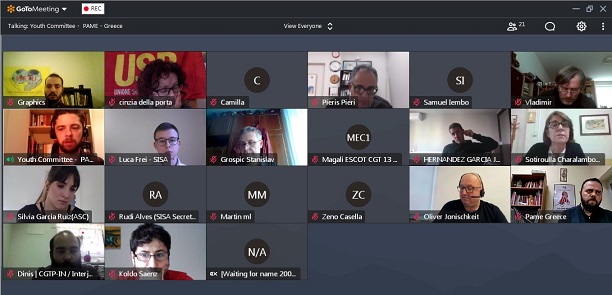Intervention of PAME on Teleworking
EUROF -WFTU Youth Committee Meeting March 5, 2021
Photos: https://flic.kr/s/aHsmUHdTwj
The new capitalist crisis, accelerated by the covid-19 pandemic, gave the governments and the EU the opportunity to pass laws on demands the employers have had for a long time, to attack wages and work rights with the goal of reducing the labor costs and of intensifying work. In Greece, the attack against the workers’ rights escalated, with an increase in part-time jobs, suspensions of job contracts, lay offs, for which the ND government legislated, thus reinforcing even more the business groups. New forms of employment were added on top of the old ones, increasing even more the level of exploitation.
One such new flexible form is teleworking. Under the pretext of the protection of the workers’ health and that of their families, teleworking was applied globally from the very first days of the pandemic. The goal of the business groups was and still is the continuation of the production process without any obstacles, without them being obliged to take true measures of protection in the workplaces, since this would be costly and not interesting economically speaking.
Teleworking always was – and still is – an objective of monopolist groups. In the last years, numerous studies have been carried out by European organizations on behalf of the employers, demonstrating the increase in work productivity. Workers become more flexible to better satisfy the needs of the employers. This flexibility is achieved through the 24h availability of the workers, the working time arrangements and longer working hours. Besides, the establishment and generalization of teleworking has long been a “desire” of the employers, among other reasons, for the attack against the stable daily working time. The lines between the working and free time have blurred and as a result, workers are available any time, any day of the week.
No matter how much effort the employers spend to present teleworking as something positive for the workers, something which both sides could benefit from, its consequences are plain to see especially in the sectors where it has been applied globally (Telecoms, Financial sector, Public sector).In fact ,teleworking allows the employers to increase at a great extent the intensification of work, with more working hours and days, unpaid overtime work, suppression of breaks, reduction in absences due to illness of the worker or of his children etc.
In addition, teleworking has significantly reduced the operating costs of the companies (infrastructure, buildings, equipment) and transfers these costs to the workers. An illustrative example is the telecom multinational NOKIA which saved globally 350 million euros in 2020 from operating expenses suspended because of the pandemic.
An important consequence in workers’ lives is the isolation from their colleagues and their alienation from the productive process. Workers are cut one from another and it is more difficult to bond with one’s colleague, to realize their role in production, to proceed in trade union actions, to discuss collectively and organize the struggle.
The employers in these circumstances escalate their attack, redundancies take place in secret, everyone feels alone towards their boss. In these conditions, the monopolies find an opportunity to attack the action of the workers, proceeding with dismissals, salary reductions, implementation of all anti-workers measures.
The “benefits” of teleworking in capitalism do not concern the workers but the profits of companies. The debate on the establishment of this form of work concerns only how much more will they earn from us, with even more laws and regulations. This is the common ground of the parties in Greece, of ND and SYRIZA-KINAL. This is also the ground of GSEE-Member of ETUC in Greece. They all agree that there should be some rules so that the profits of companies will not be affected and not all rights of the workers are violated.
The recent debate on the “right of disconnection” contained in the relevant report of the European Parliament Employment Committee, which is a recommendation to the European Commission to present a similar Directive, is typical stating that “the right to deactivate work-related tools and not to respond to requests from employers outside of working hours, without the risk of adverse consequences, such as dismissal or other retaliatory measures.“
The development that is foreseen is, “disconnection” to be regulated on the terms desired by business groups, through a framework agreement between “Business Europe” and the EU mechanism organization within the unions the “European Trade Unions Confederation” (ETUC) –as it was the case with teleworking – and then the EU will incorporate as its legislation the working darker ages, which then will have been imposed really . In this way, in essence, the issue of working time, working hours is transformed from a matter of collective claim and negotiation into a matter of individual responsibility, where the worker will be alone in front of the employer. While until today, even typically, the employer had sanctions for non-compliance with the working time, now the hands of the employers are free, for the complete abolition of any protection of the worker regarding his working time, and with the open and permanent threat of unemployment-dismissal.
The document highlights some of the effects of teleworking on workers and presents “disconnection” as a panacea, as the only real solution to the effects of teleworking. At the same time, the document provides aspects and possibilities for the employers to be able to control and allow the measurement per working day of each worker “through digital devices of Information and Communication Technologies (ICT), which means even greater control and monitoring of the workers.
In capitalism, any progress made in science is not shared between workers and companies. Although the large increase in work productivity could lead to a reduction in daily working time, however, to ensure the profitability of capitalists – especially in times of crisis – it is used to increase unpaid daily time, to increase the working day, in other words, to increase the exploitation. The aim is for the workers to strengthen their struggle, through the Trade Unions, for Collective Bargaining Agreements, for a stable daily working time with less working hours, based on the modern scientific and technological possibilities and the abolition of any form of “flexible” work. To fight against the perpetuation of teleworking, to ensure their employment and insurance rights, of their free time. To fight against the laws that dissolve the 8-hour work, work and social insurance rights, such as the planning for 10-hour work promoted by the government of ND. To claim a job with rights, with all the necessary protection measures, that are responsibility of the companies and the government.


